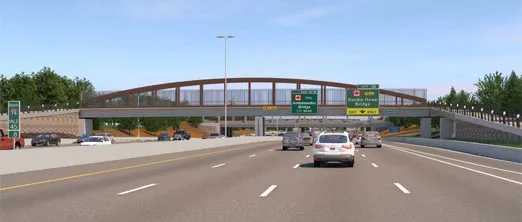The tunnel is set to open in 2023 and is intended to help reduce the chronic congestion at the existing Blackwall Tunnel. The project will also help to improve the reliability of the road network in east London. It will enable significantly improved cross-river public transport connections, with up to 37 buses an hour using the tunnel. Further pedestrian and cycling improvements will also be made on both sides of the river.
Work will be carried out on the areas surrounding the entrances to the tunnel to improve conditions for local residents and create safe, attractive new walking and cycling routes around Royal Victoria and the Greenwich Peninsula.
With congestion and air quality around the Blackwall Tunnel predicted to get worse in as London’s population grows, the Silvertown Tunnel is crucial to providing a more reliable crossing. Drivers using the Blackwall Tunnel regularly get caught up in delays of 20 minutes or more during busy times, leading to around a million hours being wasted in queues every year and costing the economy an estimated £10 million. When incidents cause the tunnel to close temporarily, 5km tail-backs can occur in under six minutes.
The new Silvertown Tunnel will be privately financed through a Design, Build, Finance and Maintain contract, with the successful delivery partner receiving payments from TfL once the tunnel is open and available for use. These will be made in part via a user charge on both the new tunnel and the existing Blackwall Tunnel. The link will require the latest tolling technology.
As part of the six-month public inquiry into the tunnel, the Mayor and TfL outlined a number of improved plans for Silvertown Tunnel with a greener focus and more emphasis on encouraging people to use public transport. These include further pedestrian and cycling improvements on both sides of the river such as upgrades to Boord Street and Tunnel Avenue in the south and Silvertown Way and Tidal Basin Road in the north.
Now that the DCO has been granted, TfL is working with local boroughs, landowners and stakeholders to outline the next steps for the project. This includes agreeing details of land acquisitions, construction logistics plans and access requirements for residents, visitors and local businesses as the scheme progresses.
TfL will also be progressing procurement of a contractor to design and build the tunnel, with a look to confirm a preferred bidder in winter 2018 and award the contract in early 2019 so that construction can begin later next year. During construction, TfL is committed to ensuring that the majority of construction material is transported by river.
Two bidders (Cintra Global and Hochtief PPP Solutions) have been shortlisted to design and build the Tunnel. As part of the tender, all contractors will be required to deliver a range of measures to reduce construction impacts.
The delivery of the Silvertown Tunnel was included in the Mayor’s Transport Strategy and forms part of the Mayor’s wider plans for sustainable river crossings across the Thames. These include a new walking and cycling crossing between Rotherhithe and Canary Wharf as well as looking at the feasibility for a new DLR crossing between Gallions Reach and Thamesmead, along with options for further sustainable crossings in west London.
New Silvertown Tunnel under River Thames in London
Transport for London (TfL) has been granted a Development Consent Order (DCO) by the Department for Transport (DfT) for the Silvertown Tunnel. This new twin-bore road tunnel will run under the River Thames in East London. The DCO is the formal process giving the green light to any development categorised as a Nationally Significant Infrastructure Project (NSIP).
The tunnel is set to open in 2023 and is intended to help reduce the chronic congestion at the existing Blackwall Tunnel. The project will also he
May 11, 2018
Read time: 3 mins








